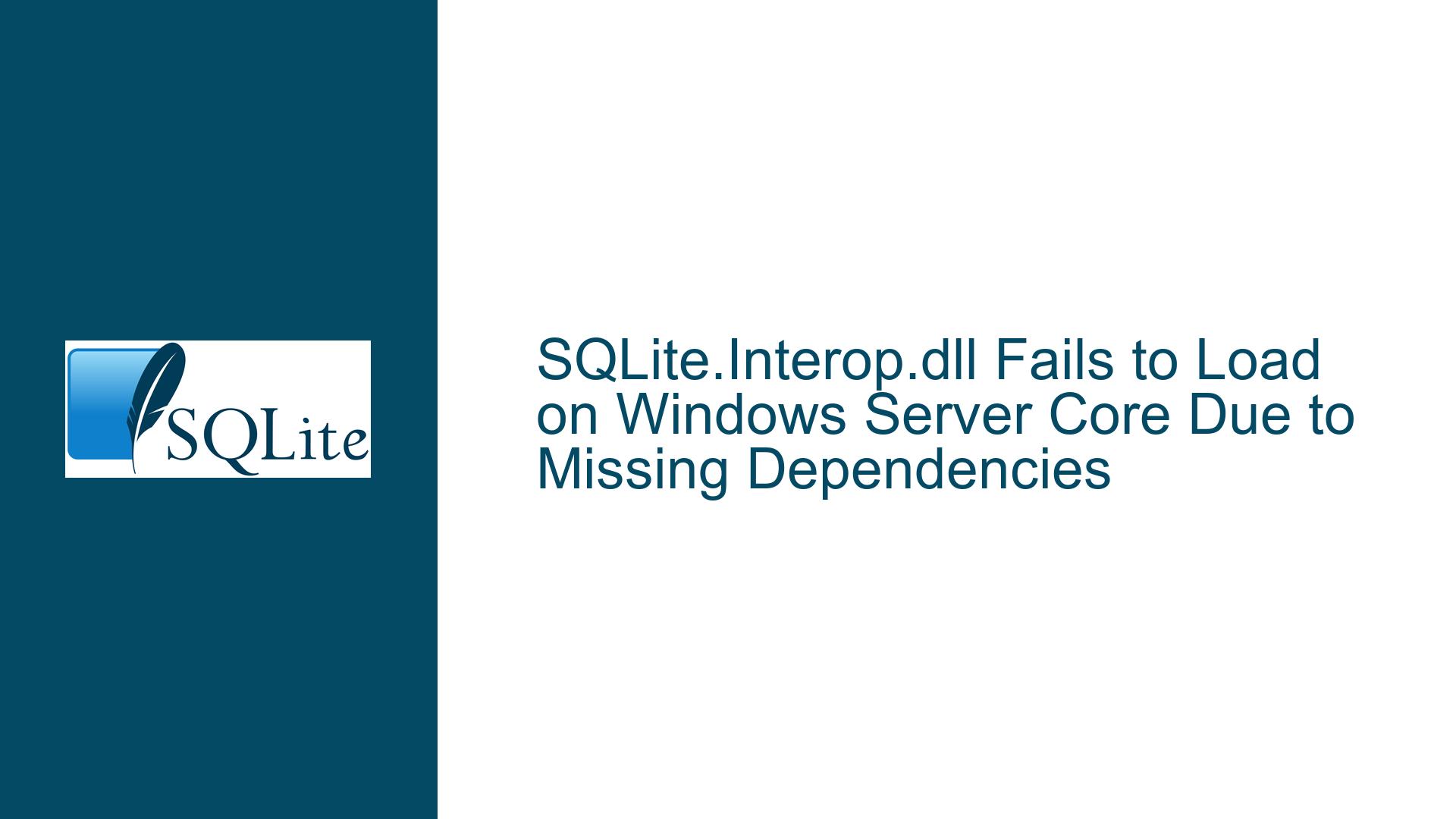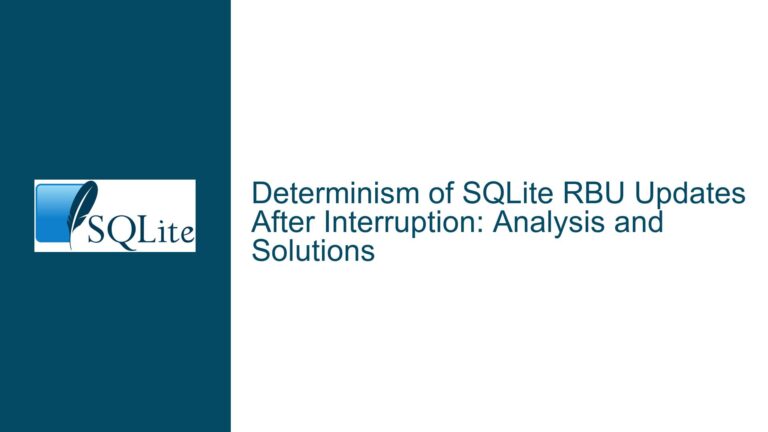SQLite.Interop.dll Fails to Load on Windows Server Core Due to Missing Dependencies
Missing System Libraries in Windows Server Core Prevent SQLite.Interop.dll from Loading
The core issue revolves around the inability of SQLite.Interop.dll to load on Windows Server Core 2019 due to missing system libraries. SQLite.Interop.dll is a critical component of the System.Data.SQLite library, which acts as a bridge between the managed .NET environment and the native SQLite engine. When running on Windows Server Core—a stripped-down version of Windows Server without the graphical user interface (GUI) or desktop experience—the application fails to load SQLite.Interop.dll because certain dependent system binaries are absent. This issue does not occur on full-fledged Windows operating systems like Windows 10, Windows 7, or Windows Server 2019 with the desktop experience, as these systems include the necessary libraries by default.
The missing dependencies are system-level libraries, such as the Microsoft Visual C++ Runtime (MSVCR110.dll), which are essential for SQLite.Interop.dll to function. These libraries are typically included in the System32 folder on standard Windows installations but are not present in Windows Server Core by default. This creates a compatibility gap, as SQLite.Interop.dll relies on these libraries for basic operations like memory allocation and system calls. The absence of these dependencies results in a runtime error, preventing the application from accessing the SQLite database.
Dependency Analysis Reveals Missing Microsoft Visual C++ Runtime
The root cause of the issue lies in the dependency chain of SQLite.Interop.dll. When analyzed using tools like Dependency Walker or dumpbin, it becomes evident that SQLite.Interop.dll depends on specific system libraries, such as KERNEL32.dll and MSVCR110.dll. KERNEL32.dll is a core Windows library responsible for low-level system operations and is present in all Windows installations, including Windows Server Core. However, MSVCR110.dll, which is part of the Microsoft Visual C++ Redistributable for Visual Studio 2012, is not included in Windows Server Core by default.
The absence of MSVCR110.dll is particularly problematic because it is a critical runtime component required by many applications, including SQLite.Interop.dll. This library provides essential functions for memory management, exception handling, and other runtime operations. Without it, SQLite.Interop.dll cannot execute its native code, leading to a failure in loading the DLL. This issue is exacerbated by the fact that Windows Server Core is designed to be a minimalistic operating system, omitting many components that are deemed non-essential for server workloads. Unfortunately, this includes certain runtime libraries that are necessary for applications like SQLite to function.
Another layer of complexity arises from the way SQLite.Interop.dll is linked to its dependencies. The library is statically linked to specific versions of the Microsoft Visual C++ Runtime, meaning it expects a particular version of the runtime to be present on the system. If the required version is missing, the library cannot load, even if a different version of the runtime is installed. This tight coupling between SQLite.Interop.dll and the runtime version creates a fragile dependency chain that is susceptible to breaking when the runtime is not available.
Resolving the Issue by Installing Missing Dependencies and Ensuring Compatibility
To address the issue, the first step is to identify the exact dependencies required by SQLite.Interop.dll. This can be done using tools like Dependency Walker or the dumpbin utility, which provide a detailed list of the libraries that SQLite.Interop.dll depends on. In this case, the analysis reveals that SQLite.Interop.dll requires MSVCR110.dll, which is part of the Microsoft Visual C++ Redistributable for Visual Studio 2012. Once the missing dependencies are identified, the next step is to install the necessary runtime libraries on the Windows Server Core system.
The Microsoft Visual C++ Redistributable for Visual Studio 2012 can be downloaded from the official Microsoft website and installed on the server. This package includes MSVCR110.dll and other related runtime components, ensuring that SQLite.Interop.dll has access to the required libraries. After installing the redistributable, it is essential to verify that the libraries are correctly placed in the System32 folder and that the system recognizes them. This can be done by running the application again and checking if SQLite.Interop.dll loads successfully.
If installing the redistributable does not resolve the issue, an alternative approach is to use a different version of the System.Data.SQLite library that is linked to a more recent version of the Microsoft Visual C++ Runtime. For example, newer versions of System.Data.SQLite may be linked to MSVCR140.dll, which is part of the Microsoft Visual C++ Redistributable for Visual Studio 2015. This version of the runtime is more likely to be present on modern systems, including Windows Server Core, as it is included in many recent Windows updates. By switching to a version of System.Data.SQLite that uses a more widely available runtime, the dependency issue can be mitigated.
Another potential solution is to bundle the required runtime libraries with the application itself. This can be achieved by including the necessary DLLs in the application’s directory and configuring the application to load them from there. This approach ensures that the application has access to the required libraries regardless of the system configuration. However, this method requires careful management of the DLLs to avoid conflicts with other applications that may use different versions of the same libraries.
In cases where modifying the application or installing additional components is not feasible, it may be necessary to reconsider the choice of operating system. Windows Server Core is designed for specific use cases where minimal resource usage and a small attack surface are prioritized over general-purpose functionality. If the application requires components that are not included in Windows Server Core, it may be more practical to use a full-fledged version of Windows Server with the desktop experience. This ensures that all necessary libraries and components are available, eliminating the dependency issues.
In summary, the issue of SQLite.Interop.dll failing to load on Windows Server Core due to missing dependencies can be resolved by identifying the required libraries, installing the necessary runtime components, or switching to a version of the library that uses more widely available dependencies. By understanding the dependency chain and taking appropriate steps to address the gaps, the application can be made compatible with Windows Server Core, ensuring smooth operation in a minimalistic server environment.






